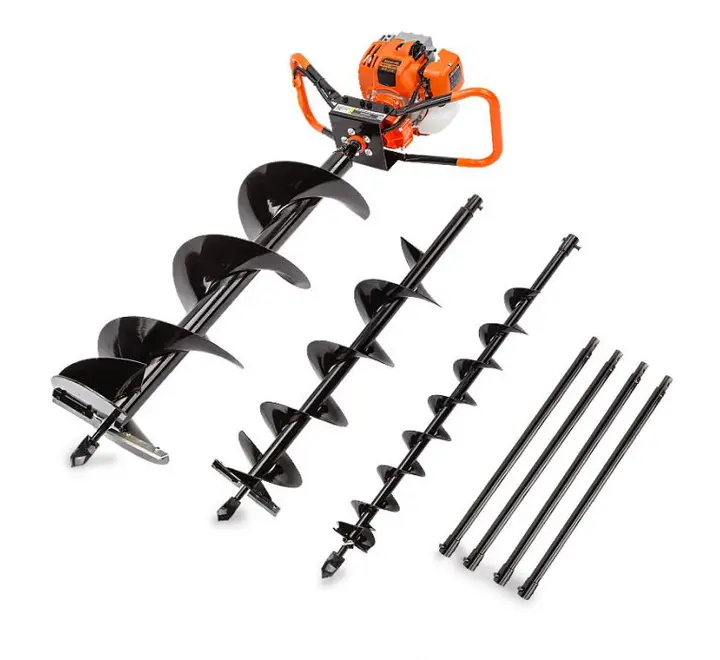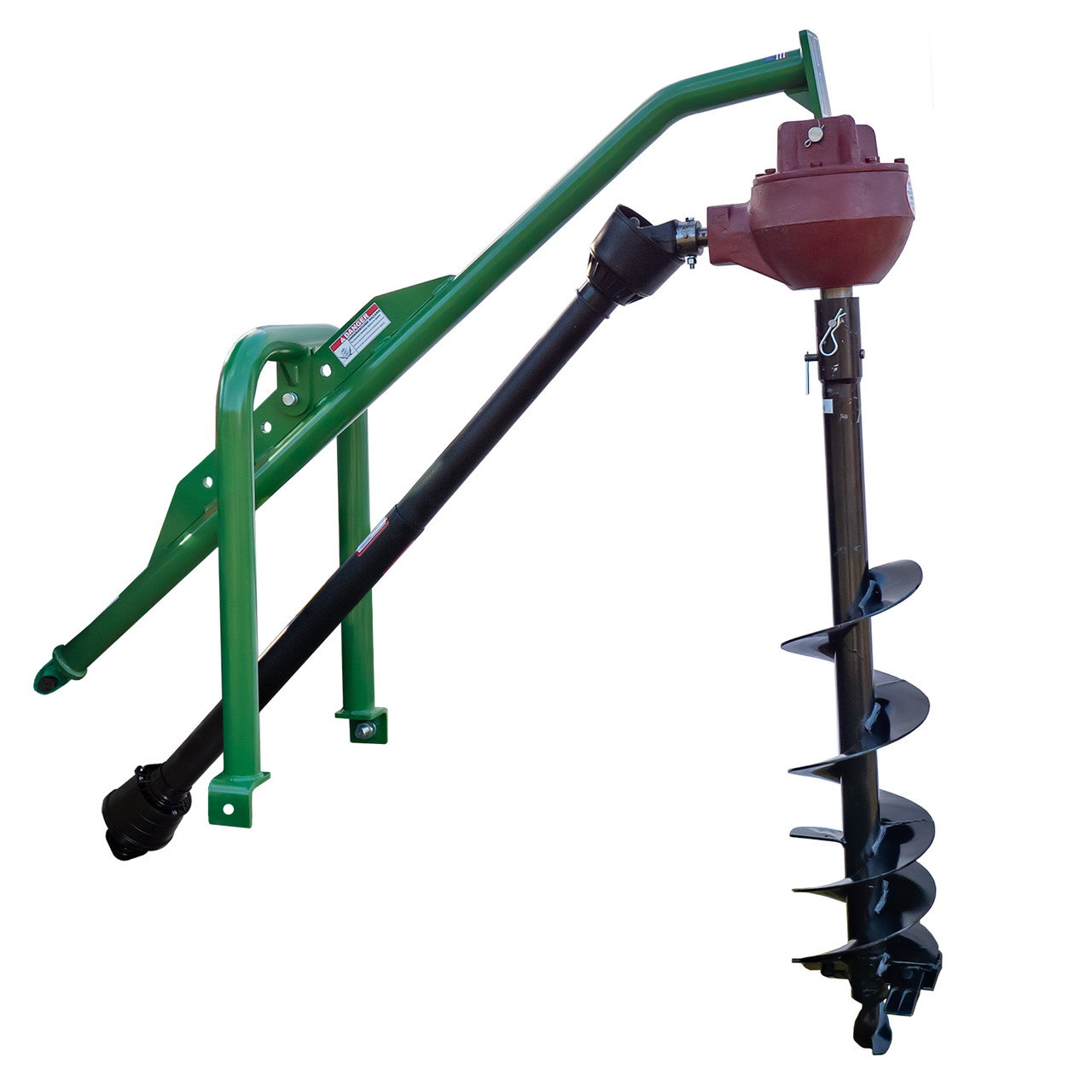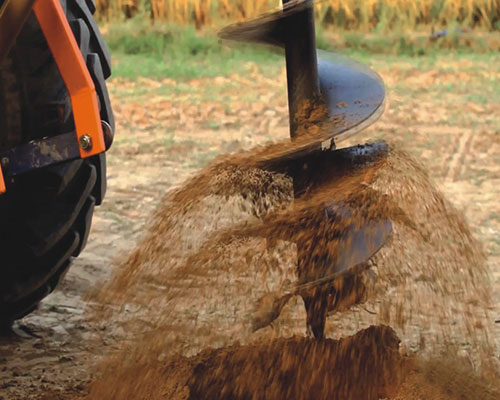Product Description
ATV Post Hole Digger
1.; With 9hp Engine
2.; Suitable for digging manholes,; holes for plants and fences,;etc.;.;
3.; Max diameter of the hole:; 300mm
4.; Max digging depth:; 2130mm
5.; Tires 16″
6.; Augers are available in different size:; 5″ auger,; 6″ auger,; 8″auger,; 10″ auger,; 12″auger
| Model | ATEA-9HP |
| Engine | 9hp |
| Pressure Relief Setting | 2000psi |
| Max Flow | 3gpm |
| Hydraulic Fluid Capacity | 4 gallons |
| Max Auger Diameter | 12in |
| Hydraulic Motor Speed | 55rpm |
| Hydraulic Motor Torque | 3800 in-lbs |
| Towing Coupler | 2″ |
| Max Towing Speed | 45mph |
| Overall Dimensions | 115″×41″×61″ |
| Weight | 168kg |
| Usage: | Soil Working |
|---|---|
| Power Type: | Hydraulic |
| Type: | Core Drilling Rig |
| Condition: | New |
| Model: | Atea-9HP |
| Engine: | 9HP |
| Customization: |
Available
| Customized Request |
|---|

Can you provide examples of projects or applications that require a post hole digger?
Post hole diggers are versatile tools that find application in various projects and tasks that involve digging holes. Here are some examples of projects or applications that commonly require the use of a post hole digger:
- Fence Installation: When installing fences, post hole diggers are essential for digging holes to secure the fence posts. Whether it’s a wooden, metal, or vinyl fence, a post hole digger allows for precise and consistent hole digging, ensuring the stability and longevity of the fence.
- Deck or Patio Construction: Building a deck or patio often involves setting support posts into the ground. Post hole diggers are used to excavate holes for these posts, ensuring that they are properly anchored and provide a solid foundation for the structure.
- Signage or Street Lighting Installation: In projects involving the installation of signage, street lights, or other outdoor fixtures, post hole diggers are employed to dig holes for the supporting posts. This ensures that the signs or lights are securely mounted and can withstand external forces and weather conditions.
- Landscaping and Gardening: Post hole diggers are useful for various landscaping and gardening tasks. They can be used to dig holes for planting trees, shrubs, or large plants, allowing for proper root growth and stability. Additionally, post hole diggers are employed in installing garden trellises, arbors, or pergolas.
- Flagpole Installation: When erecting flagpoles, post hole diggers are utilized to dig the holes for the flagpole base. This ensures that the flagpole stands upright and remains stable, even in windy conditions.
- Foundation Repair: In certain foundation repair projects, post hole diggers are employed to excavate holes around the foundation for the installation of support piers or foundation underpinning. These holes allow access to the foundation, facilitating the repair or reinforcement process.
- Utility Pole Placement: Post hole diggers are commonly used in utility pole installation, where holes need to be dug to accommodate the poles. This is crucial for the installation of power lines, telephone lines, or other utility infrastructure.
- Building Construction: Post hole diggers play a role in various construction projects, such as the installation of structural supports for small buildings, sheds, or pergolas. They are used to dig holes for the support posts, ensuring a stable and secure structure.
These examples demonstrate the diverse range of projects and applications where post hole diggers are essential tools. Whether it’s for residential, commercial, or industrial purposes, post hole diggers enable efficient and accurate hole digging, contributing to the successful completion of various construction, landscaping, and installation projects.

Can post hole diggers be adapted for use in both residential and commercial projects?
Yes, post hole diggers are versatile tools that can be adapted for use in both residential and commercial projects. Their design, features, and capabilities make them suitable for a wide range of applications, regardless of the scale or nature of the project. Here are some reasons why post hole diggers can be effectively used in both residential and commercial projects:
- Size Options: Post hole diggers are available in various sizes to accommodate different project requirements. They come in compact, lightweight versions ideal for residential use, as well as larger, heavy-duty models suitable for commercial projects. The availability of different size options ensures that post hole diggers can be matched to the specific needs of the project, whether it’s a small backyard fence installation or a large-scale commercial construction project.
- Adjustable Depth and Diameter: Many post hole diggers feature adjustable depth and diameter capabilities. This adaptability allows users to customize the digging parameters based on the specific project requirements. Whether it’s digging shallow holes for residential fence posts or deeper holes for commercial applications such as signposts or structural supports, post hole diggers can be adjusted to meet the desired depth and diameter specifications.
- Soil Compatibility: Post hole diggers are designed to handle various soil types commonly encountered in both residential and commercial projects. They can effectively dig holes in soil compositions such as clay, loam, gravel, or sandy soils. This versatility ensures that post hole diggers can be used in different geographical locations, whether it’s a residential backyard or a commercial construction site.
- Portability: Post hole diggers are generally designed to be portable and easy to transport. They can be maneuvered and operated in different project locations, whether it’s a residential property or a commercial worksite. The portability of post hole diggers allows for flexibility and convenience in tackling various projects, making them suitable for both residential and commercial applications.
- Efficiency and Time Savings: In both residential and commercial projects, efficiency and time savings are essential. Post hole diggers offer significant advantages in this regard. Their mechanical action, whether manual or powered, allows for faster and more efficient digging compared to manual methods. This translates to time savings and increased productivity, benefiting both residential homeowners and commercial contractors.
- Multiple Applications: Post hole diggers have multiple applications beyond residential or commercial projects. They can be utilized in various industries such as agriculture, landscaping, and construction. Their versatility makes them valuable tools for tasks like planting trees, installing poles, erecting signs, or setting up outdoor structures. This wide range of applications further highlights the adaptability of post hole diggers across different project types and sectors.
Overall, post hole diggers can be effectively adapted for use in both residential and commercial projects. Their size options, adjustable depth and diameter capabilities, soil compatibility, portability, efficiency, time savings, and multiple applications make them versatile tools that can tackle a wide range of projects, regardless of the residential or commercial context.

How do post hole diggers handle variations in soil types and conditions?
Post hole diggers are designed to handle variations in soil types and conditions, allowing for effective hole digging across different terrains. Here’s how they address these variations:
- Blade Design: Post hole diggers typically feature blades or augers with different designs to accommodate various soil types. For example, some blades have pointed tips and aggressive cutting edges, which are suitable for penetrating hard or compacted soils. Other blades may have a more open design with wider spacing, allowing for easier soil removal in softer or looser soils.
- Auger Size: Post hole diggers come in different auger sizes, allowing for versatility in handling different soil conditions. Larger augers are suitable for digging in softer soils where more soil needs to be displaced, while smaller augers are better for compacted or rocky soils where more effort is required to penetrate the ground.
- Power Source: Motorized post hole diggers, such as gas-powered or electric-powered ones, provide additional power to handle variations in soil types and conditions. The increased torque and rotational force generated by the power source enable the auger blades to overcome resistance in challenging soils, including compacted soil, clay, or rocky terrain.
- Adjustable Depth: Some post hole diggers offer adjustable depth settings, allowing operators to dig holes of varying depths. This feature is particularly useful when encountering different soil layers or when specific hole depths are required for a particular application. Operators can easily adapt the depth setting to match the soil conditions they are working with.
- Operator Technique: The operator’s technique plays a significant role in handling variations in soil types and conditions. Experienced operators know how to adjust the pressure, angle, and rotational speed of the post hole digger based on the specific soil they are working with. They may modify their approach to account for variations in soil hardness, moisture content, or presence of rocks or roots.
- Additional Tools and Accessories: In some cases, additional tools and accessories can be used in conjunction with post hole diggers to address specific soil challenges. For example, soil auger extensions can be added to reach greater depths in deep or sandy soils. Soil loosening agents or water can be employed to soften or moisten the soil, making it easier to dig.
By incorporating these design features, adjusting settings, employing proper technique, and utilizing additional tools if necessary, post hole diggers can effectively handle variations in soil types and conditions. However, it’s important to note that extremely hard or rocky soils may still pose challenges even for post hole diggers. In such cases, alternative methods or specialized equipment may be required to complete the digging task successfully.


editor by CX 2023-11-27